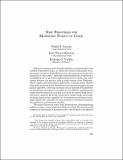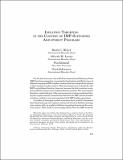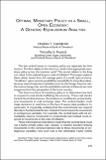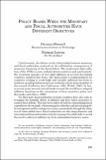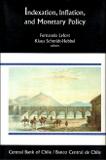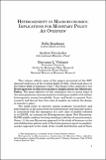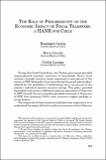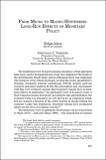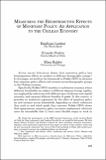Buscar
Mostrando ítems 11-20 de 132
New frontiers for menetary policy in Chile
Inflation targeting can be broadly defined as a framework for the conduct of MONETARY POLICY in which the central bank guides its instruments in order to hold inflation near a preannounced target or to bring back to the target. Although understanding the framework is straightfoward, its practical ...
Inflation targeting in the context of IMF-Supported adjustment programs
For the last few years, the staff of the Iternational Monetary Fund (IMF) has been engaged in assessing the functioning and effectiveness of inflation targeting in IMF member countries that have adopted this scheme as their monetary policy anchor. This involvement was restricted to the IMF's surveillance ...
Optimal monetary policy in a small, open economy: a general-equilibrium analysis
The two central issues in monetary policy are separated by time horizon. The first relates to the short run: what is the appropriate monetary policy across the business cycle? The second relates to the long run: waht is the optimal long-run rate of inflation? This paper explores these classic issues ...
Policy biases when the monetary and fiscal authorities have different objectives
Until recently, the debate on the relationship between monetary and fiscal authorities centered on the inflationary consequences of mentary financing of the fiscal deficit. The moderately high inflation of the 1970s in some industrialized countries and, particularly, the recurring episodes of very ...
Indexation, inflation, and monetary policy
Although indexation policies and practices are common in many markets and economies, their implications for market efficiency and price stabilization remain controversial. This book contributes to the literature on indexation and inflation by including nine articles that are at the research frontier ...
Heterogeneity in macroeconomics: implications for monetary policy an overview
This volume collects some of the papers presented at the XXV Annual Conference of the Central Bank of Chile, which took place in
November 2022 in Santiago, Chile.1 The theme of the conference was Heterogeneity in Macroeconomics: Implications for Monetary
Policy. The main objective of this conference ...
Managing an energy shock: fiscal and monetary policy
Prepared for the Proceedings of the XXV Annual Conference of the Central Bank of Chile, held in November 2022. We are grateful for helpful comments and suggestions from Jenny Chan, Sebastián Edwards, Jordi Galí, Peter Ganong, Pierre-Olivier Gourinchas, Jonathan Heathcote, Oleg Itskhoki, Enisse Kharroubi, ...
The role of progressivity on the economic impact of fiscal transfers: a HANK for Chile
During the Covid-19 pandemic, the Chilean government provided unprecedented economic assistance to households. Direct fiscal transfers through stimulus checks amounted to nine percent of the country’s GDP. Aditionally, three times during the period, policymakers allowed for the possibility of withdrawing ...
From micro to macro hysteresis: long-run effects of monetary policy
The traditional view of macroeconomic dynamics is that aggregate time series can be decomposed into a long-run component (the trend, or the deterministic steady state) and an orthogonal short-run component (the business cycle) which fluctuates around the trend. Quantitative dynamic stochastic general ...
Measuring the redistributive effects of monetary policy: an application to the chilean economy
Active recent literature shows that monetary policy has heterogeneous effects on workers in different demographic groups.1 In this paper, we build on the framework in Rubbo (2023) to estimate how monetary policy affects real incomes across demographic groups
in the Chilean economy.
Specifically, ...

